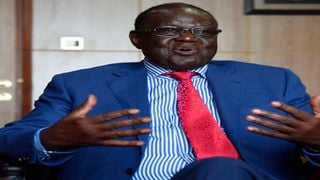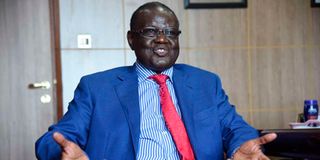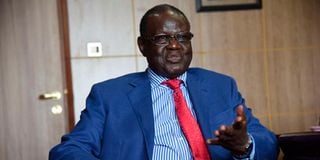
Meru Governor Kiraitu Murungi during the interview with the Sunday Nation at his Nairobi office on November 30, 2021.
| Evans Habil | Nation Media GroupPolitics
Premium
Kiraitu Murungi: How Mwai Kibaki stopped us from arresting Moi
What you need to know:
- Meru governor speaks on why Ruto’s UDA claims he stole their party colours when he launched his political outfit.
- He also offers insights into the cold war between him and Agriculture minister Peter Munya.
In the second and final part of our interview with him, the former Kibaki insider talks about the intrigues in government shortly after former president Moi handed over power to an immensely popular successor.
Did you, alongside other ministers in the Kibaki government, plan to arrest Moi after his retirement in 2007? It is said that it took President Kibaki’s personal intervention to stop that.
I was the minister for Justice and Constitutional Affairs at the time. I had come from civil society where there was a lot of debate on how Moi had committed a lot of crimes and ought to be arrested. Some of the charges had already been drafted. That pressure to arrest Moi was immense, especially from civil societies.
At the time Joseph Boinnet was the head of intelligence and he was getting all this information, but Kibaki did not want us to fight Moi. The house Moi used to occupy at Kabarnet Gardens was meant for the Vice-President and there was pressure for us to evict him so that Kijana Wamalwa, the new VP, could occupy it.
We went to consult Kibaki about the eviction with Amos Kimunya, who was the minister for Lands at the time, but Kibaki told Kimunya to process a title deed for the property in Moi’s name and hand it over to the retired president, which he did.
Later on I made a statement that Mzee Moi should retire and go back home in Kabarak, where he should spend his days watching TV to see how good governments are run. This was around the time when it had been decided that no action would be taken against Moi, and I was sending the message that we would not be taking any action again him. But Kanu stalwarts accused me of abusing Moi.
Do you think the mention of Kabarak and not Kabarnet Gardens might have been misconstrued to mean you wanted him to vacate the Nairobi home?
Actually, I said Kabarnet. Like I said, we were being pushed by civil societies to have Moi arrested but our leader had said we did not have to waste resources dealing with Moi, and you know he was relying on the intelligence he was getting.
Around the same time, I had appointed Prof Makau Mutua to lead a taskforce to decide whether we needed a truth, justice and reconciliation commission. We were borrowing from what Bishop Desmond Tutu had done in South Africa. Prof Makua and Rev Timothy Njoya went around for six months and wrote a report that showed that the majority of the people would like us to establish such a commission.
Then we got intelligence that there would be a fresh wave of tribal clashes in the Rift Valley were we to implement the report. These were not the kind of things we wanted because of the new mood of stabilising the country, so it was decided that we should shelve the report.
The crowds kept asking what happened to the report and then it was said that I had misadvised the President. The TJRC was very popular and people said that I had changed, and that I was no longer the man they supported. When in power, it is different from when you are in civil society because in civil society you are on a single lane but when in power you look at things from very different angles to see what would be the final consequences.
With the benefit of hindsight, do you now think that the President acted in the best interest of the country?
Yes, I think Kibaki was right. We would have torn this country apart. You remember how they harassed Kenneth Kaunda around the same time in Zambia and tried to say he was not Zambian?
I think coming from where we were, what we needed as a country was drafting strategies on how to move forward. As I said, in a democratic setting, you cannot have a radical break with the past. It is not possible because the people who helped you come to power have roots in the past system.
You cannot make radical reforms in a democratic system. It has to move slowly. It is not like when you shoot your way to power because that way you can even afford a revolution. As long as you are elected, you have so many equations to balance in your quest for votes. You also have a lot of people with different agenda and you have to compromise. Democracy is about listening and compromise.
Why have you launched the ‘Bus’, your DEP party?
The ‘Bus’ has come because of the political reality of the country. We have tried the ‘Big Ford’, it has not worked, and we have tried Narc and it has not worked. We even have PNU which was supposed to be a national party, but it did not work. We have tried with Jubilee, it has not worked.
I think we should accept that Kenya has not reached where we thought it had and the best thing is to deal with these issues through small parties that will then coalesce to form coalitions. Even in Germany they we have parties, like the CSU (Christian Social Union) from Bavaria, which are very young and regional, but which are always in coalition with the main parties.
Will DEP field candidates across the country?
Yes, we intend to field candidates across the country and we are just starting. The Constitution requires us to have presence in at least 24 counties, and those counties cannot just be around Mt Kenya East, they have to be elsewhere too.
When we have this presence, we will also want to have candidates in those areas so that we field MCAs and MPs to Senators and Governors. The only position we feel we are not yet ready for is the presidency. That one requires much more organisation and utilisation of resources but we should be able to join that race come 2027.

Meru Governor Kiraitu Murungi during the interview with the Sunday Nation at his Nairobi office on November 30, 2021.
Ruto’s UDA accuses you and DEP of stealing their colours. Why couldn’t you settle for a different set?
The original ‘Bus’ colours are exactly what UDA are using. If you look at the Bus’s colours in 2013 you will notice that, that is what UDA borrowed. There are now more than 70 political parties in the country. The primary colours are only seven, so no single party should own any single colour or other parties will have nothing. We just try to make a few changes here and there.
In our case, we have decided not to have yellow, but use gold. Our colour is gold, black and green; UDA has yellow and green. We are not really the same. But the Registrar of Political Parties has a lot of work to do because even the names are running out, and that is why we had Ford, Ford-Kenya, Ford-Asili, and Ford-People. We have to accommodate each other.
Why should you be reelected as Meru Governor?
For only one reason. I am telling our people, even a decorated donkey is still a donkey. Even if you apply lipstick to it, it still remains a donkey. It does not matter what colours people come wrapping themselves in. Some will come saying they are ODM, that is a colour, others will come saying they are UDA, others Bus, and whatever, but the voter should go beyond those colours and build a name of what they have done and see what kind of person this person coming to them is. Who is the candidate, what is his strategy? What is he producing in terms of development?
You campaigned for your predecessor and current Agriculture CS Peter Munya in 2013 yet today you don’t seem to be the best of buddies. What was the point of departure?
It is nothing personal. Indeed we have come from far. We worked together when he came from the University of Nairobi for pupilage in my law firm, and he also married from my village. We campaigned together with the common agenda of having an all-inclusive leadership and making Meru great.
Our point of departure was when he cut off the other leaders, MPs, those in the Senate and other leaders. He started working alone. I tell people that if they feel the former governor touched their lives more than I have in terms of development in the villages, then they should vote for him. But if they feel Kiraitu Murungi has done better, let them elect me because we are not being elected because we have beautiful names, or we sing very well, but because of tangible, visible development.
(Mr Munya has not indicated whether he would like to go for the governorship once more.)
Which way for Mt Kenya in national politics? There is Ruto with his UDA, and then there is Raila.
Ruto has been in the region for a very long time. I think he has visited Meru about 53 times since the elections. Naturally, because Ruto has been there, visited many churches and worked with many MPs, he has a lot of recognition at the village level.
But now, a question has come, comparing him and Raila, who will be a better leader for this country? That is the debate going on in Mt Kenya because we believe the president will not come from Mt Kenya region this time round and for the next ten years the presidency will be somewhere else.
So the question the Mt Kenya people are asking is: Might we be going back to where we were when Moi was in power and we were ignored as a region? When there was poverty, when the coffee industry collapsed, and even taking children to school was a problem?
Personally, I am supporting Raila because I want more resources coming to my county. I do not have to beg for development from anybody else. Ruto is exciting the youth and the so-called hustlers, and we are still listening to him. What is the future he is planning for our people in agriculture, for instance?
Raila’s traditional base has not changed very much. He has had very faithful supporters since 2007 and even when we used to defeat him, rarely did we defeat him with a million votes; it was always a difference of 300,000 votes or so. Now, if he gets just a million from Mt Kenya region, he is likely to be the next president.

Meru Governor Kiraitu Murungi during the interview with the Sunday Nation at his Nairobi office on November 30, 2021.
But the likes of Musalia, his allies in the last polls, are threatening to chip away part of that traditional support base.
Musalia was a candidate in 2013; how did he perform? Raila beat him in Luhyaland! This story is being looked at, but really, for me, I think, we should have another 2002 where leaders from the various communities come together and have a One Kenya agenda, where Musalia, Kalonzo, Moi, Wetang’ula and others will not be left out.
We are trying to have as many leaders as possible, leaders motivated by the need for a unified Kenya. People should also not be selfish. The presidency can only take one person. Even in the church, you can only have one person preaching at a time but it does not mean that there are no good preachers within the congregation. As a country, we should relax and let one person lead.
There are suggestions that the only way for both Raila and Ruto to win is for each to pick a running mate from Mt Kenya region. What’s your take?
Running mates are not chosen on the basis of being influential. You want to win? You look for a running mate who can add your influence, one who can add votes. In Central Kenya we have about five million votes. That is a lot of votes. It makes political sense for a politician to pick a running mate from that area. I will not be surprised if both Ruto and Raila picked their running mates from Mt Kenya.
Let’s change gears and go back to the Kibaki era. How was it like to work with President Mwai Kibaki?
I think I was a lucky person to get to work with president Kibaki. I met him when we were much younger. We were street activists and sometimes radical, but Kibaki was very calm, very intelligent and I enjoyed even listening to him.
One time we got a team from the World Bank from Washington in the US and they came saying these cooperatives were not making sense. They were taking about coffee, saying the farmers were grey-haired men, that there were no young men or women, that the world had moved on so why don’t we just disband them and create private enterprises to run our agriculture instead of these cooperatives?
Kibaki listened to them and said: “That is okay, but I have one question for you. You are a man who owns one cow in a place called Nyahururu, all your neighbours own cows, so you cannot sell milk to each other because they all have milk. How do you take your milk from Nyahururu to Nairobi, unless you get together with your neighbours, put that milk together and then bring it to Nairobi?”
He then told them: “What you have said can be good in Washington, but here we have our own way of doing things.”
And that was the end of the meeting. He did not tell them off, but softly explained to them why what they were saying did not make sense here. We admired him for that. He was very sharp.
On the idea of bringing parties together, I remember us telling him that we were going to bring Kanu, Wiper and PNU together to form a very formidable team.
He asked me: “Now, in the villages there are people called Kanu Chairmen. When you bring them together, what will happen to that Kanu chairman? Do you think he will willingly leave that position that he has held for the last 15 years so that he can be part of that party you are talking about? You go and think about it.”
That was Kibaki. He was not combative. He just engaged everyone. Once he left you to work, that was it. We were the ones who looked for him. Once he assigned you, you were the one to consult him. He left us to work without interference as ministers and as his team. I have not heard a minister who talked badly about him.
Was there any time he called you ‘pumbavu’, his signature expression of disgust?
No! But I heard him call people that several times. One day we met some wazees in Meru who were saying that they would not allow him retire, that they wanted him to continue as President. So Kibaki said: “Wachana na hiyo upumbavu” and dismissed them.
Another time we were driving around and some boys who showed up in the road and asked us to give them some little cash. Kibaki asked: “Why should these people be given money? What have they done? Should we just be paying people for standing by the road?”
When PNU formed a new secretariat with Raila’s party to run the green campaign, he appointed me and Prof Peter Kagwanja to run the secretariat on the side of PNU. On the other side, Prof Anyang’ Nyong’o and Janet Ong’era were appointed by Raila.
The four of us were now to man the campaign for the 2010 constitution, and so we decided to do a harambee at KICC to raise money to start off the secretariat. Raila gave Sh1million. We went to Kibaki and he gave us Sh500, 000. We told him he should give us more as Raila had given us Sh1 million.
He was livid!
“No, no, kama anataka kupeana milioni moja si apeane tu!” he told us. “I will only give you what I have.” And for sure he only gave us the Sh500, 000. Among us we agreed that Raila would not be seen to have given more than the President, so we topped up the Sh500, 000 with Sh700,000. At the harambee we announced that Kibaki had given us Sh1.2 million!
He must have been furious when he learnt of the lie.
We did not tell him when we got back to him. That was Kibaki though. We could not convince him to add a penny to his Sh500, 000. He was not a people pleaser. He just did the right thing.





